My Mass Effect 3 Complaints and Lamentations
There's a lot about Mass Effect 3 that fucking rules. Severe editing or outright removal of many irritating, counter-intuitive, unnecessary, and aggravating things. So many things. And I'm going to cover them all, because it's important for me to paint the full picture of why I hated Mass Effect 3. I'll do my best to cover each aspect of the game so that I can get all the observations that I've made over the past couple months. Months that I didn't want to spend thinking about this game, because of how depressed it really made me. To be clear, I don't think that writing it differently would make for a better game.
I know it would.
Let's start with the good, because my family loves nothing more than to preface a major slam with a compliment. In my ME2 article, I brought up a lot of technical issues I had that made the game less fun and more tedious. They've addressed most of these, and the ones they haven't are justified by the wartime atmosphere:
- Planet scanning is basically gone. Now, you'll scan a maximum of two planets per system, for one item per planet, that directs you towards itself with an arrow. And now you're not looking for shitty platinum, you are looking for relics, survivors and resources for the war effort. You know, things that actually matter. Good riddance, old system. Goodbye mineral mining, no one will miss you.
- The fuel system was annoying before, but now it's war and it adds to the tension. When the impetus to explore and risk your ship expending fuel is, "I wonder what's over there?" I'll never have enough wonder to potentially fuck myself out of upgrading my weapons and ship, as was the case in ME2. However, when the impetus is, "the chances of every species in the galaxy surviving will have a improve if I find something useful over there,".... I'm fucking going over there. Of course I am.
- They added reaper chases to the galaxy map, which makes it more exciting. Before, the galaxy map was a means to get from point A to point B. Now, you are actively engaged most of the time you use it. The actions that were before tedious are now tense. Do I scan the planets on the outer rim first or the interior? Do I have enough time to get the resources off of this planet before the reapers catch up and destroy my ship? Stress is ALWAYS better than boredom, when utilized properly.
SKRILLEX ATTACK OFF THE STARBOARD BOW
- The Memorial Wall. If you ever doubted that shit was about to get real, nothing eases that doubt like a monolith with enough spaces on it for every person you've ever met.
This ought to boost crew morale...
- The new gay crewmembers, Steve Cortez and Samantha Traynor. Does it feel like a gimmick? A little bit, to be honest. But I'm still glad they have a guy who casually mentions being married to another man, and Shepard doesn't go, "MARRIED? FAGGOTS?!" or even bat an eyelash for that matter. Because in the future, people will finally admit that they don't give a shit.
- The total overhaul of the morality system. Finally, you don't have to worry about consistently kissing or setting fire to every person you meet's ass. This is a majorly appreciated return to the status quo of the first game. No more asshole bar and Jesus bar!
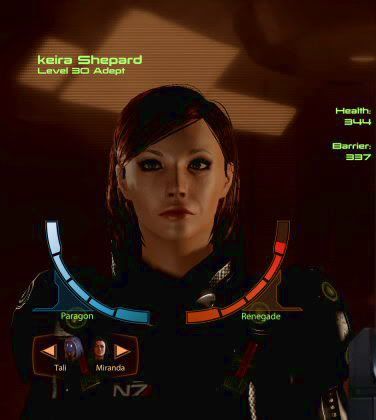
Seriously, fuck these bars.
- MOTHERFUCKING RUNNING. It's like someone heard me make fun of Shepard and replied with, "Oh yeah? Well now he can run for eternity." Admiral Anderson's goofy Team America puppet running aside, I spent as much time as possible in this game just fucking running.
Hey, at least they don't have to stop for air every four seconds.
- The removal of heavy weapons. Nothing deflates tension like a weapon that kills everything in the room, instantly. Now you get one lying around on the battlefield very rarely, and it hardly mops up the room.
"BOOM SHAKALA-"
"For the 9,000th time, WE HEARD YOU."
- The addition of a health bar. Because now medigel actually does what it sounds like it does. And now there's no more mutant healing, which is one of the lazier game design choices of the last ten years.
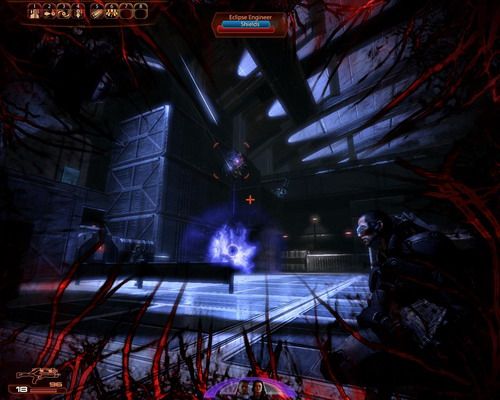
He's flatlining. Get me 50ccs of squatting behind a crate for 3 seconds, stat!
- The cover in the cover system no longer dictates the aesthetic of the environment. No longer are you on a different floor of Ted's Cover Emporium. Although cover is still plentiful and still necessary, I never once had a moment like I did on the prison ship Purgatory where I couldn't possibly believe that I was actually in a prison.
"Where should we put these explosive barrels?"
"Eh, put out in the yard with the magical flip-up cover."
- The weapon system. ME1 just gave you a pile of stat sticks and ME2 gave you a basket of fruit. Not only does ME3 have a wealth of guns, but the mods, weight system and general diversification give it depth it never had.
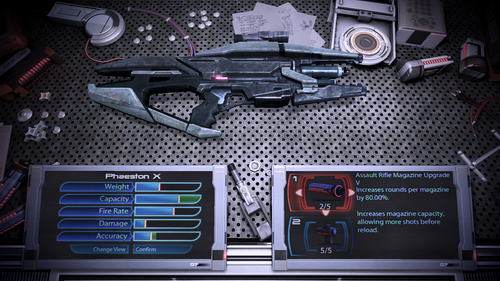
- Way more ammo drops. Not once in two playthroughs did I ever full run out of ammo for even one weapon. Came very close, but I never had to shoot a mech to death with a shitty SMG.
- The environments no longer feel like they have the illusion of size. When I was running around on Palaven's moon, that level felt huge. It didn't just show me pictures of hugeness. You run around a lot in that mission. It feels more like a place in that way.
This level is bigger than Mass Effect 2.
- The ability to acknowledge synthetic life as equal. From a philosophical standpoint, I found this really important. There's a difference between treating someone or something politely and treating them with genuine respect and affection. Jeff's feelings for EDI represent how far we've come from the "all machine intelligence is threatening" viewpoint of the last thirty years. When a cripple looks at a sophisticated AI in a metal robot body and his first thought is, "but what if she doesn't feel the same way?", we've officially headed in a direction I approve of. That strange feeling your brain has when you see things it wasn't wired to contemplate, that's something we should be trying to have more often.
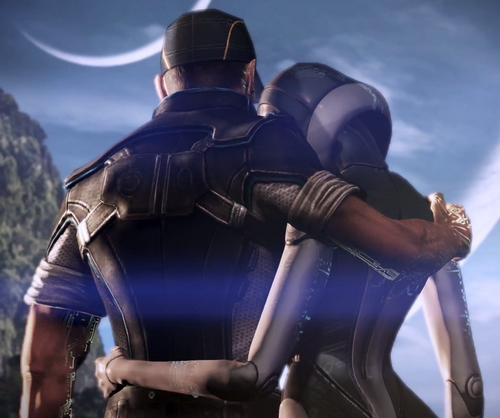
Why we aren't seeing this in art more, I have no idea.
- Seeing the krogan from a more humanizing perspective. It's nice that after years of seeing krogan painted as bullies, terrors, and on their best days, noble lunatics, we can actually empathetically see them as something else: helpless victims. It's one thing to hear it from Wrex, but another thing entirely to know that you hold the potential for their growth in your hands. Seeing one female shut up an entire room full of growling Batmen illuminates the nuance that has always been in there.
Krogan response to everything ever said: "RARRRGH!"
- A female krogan, and a female salarian. I wanted more females of all species, but this is better than nothing. Really, more than anything I wanted to see turian women. That there wasn't a single one was really inexcusable. Maybe they'd be the second race with more than three fingers and really blow our minds. Now we'll never know.
- Insight into the true nature of the protheans. Feelings about the way Javik was implemented through DLC on day one aside, it must be acknowledged that as a cipher for the culture of an entire extinct species, he brought a lot to the table. They managed to perfectly contextualize how their species came to proliferate technology across the galaxy, but why their biggest strengths also became hindrances against the reapers. Describing evolution as "the Cosmic Imperative" explains hundreds of years of actions and attitude in three words.
When you need to cram in a bible's length of exposition, always go with an exotic voice.
- Sex scenes that were slightly more tame than a PG movie. I'm still annoyed that ME1 is the closest we got to adult content, but it's better than ME2.
- Giving Conrad Verner an actual skill. It's the final punchline that the character needed.
- Making Khalisah Bint Sinan al-Jilani a human being. It's always nice to have a punchable cunt on hand to punch, but after three games, it's even nicer to see that there's more depth to the character.
Can I still punch her for old time's sake?
- The fighting in space cinematics finally look epic. in ME1, it was flat and boring, and in ME2, there weren't any. And no, the fight with the Collector ship doesn't count. Although in ME3, it is adorable to pretend that Shepard is somehow magically directing the entire space fleet. Awww, someone thinks he's giving out orders!
The amount of ships in this scene is also something you shouldn't count, if you want to keep your free time.
- The major mission labels on the systems, (i.e. Meet With The Quarians), doesn't cover up other systems like it used to.
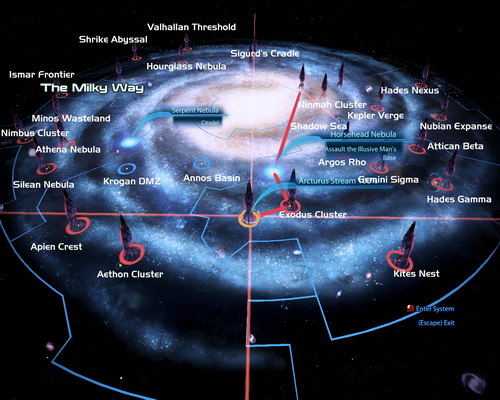
Well, sorta, anyway.
I could honestly spent the next couple hours covering all of the character moments in this game that are unbelievably well written. I can't stress this enough. Even on my second playthrough for this review, which was punctuated with dread and irritation, I lost count of how many fucking great moments this game has. Just to give you an idea, I'll list a few of the ones that really hit me squarely in the strawberry tart.
If this seems excessive, these are only the ones that are easy to find on Youtube. The game is swimming in emotionally effective moments like this. It's unfortunate that all of the gets upstaged by...
These are all three canonical endings for Mass Effect. No matter what you did, no matter who you saved, no matter what happened in the universe, these are the three endings. To be clear, the recent DLC Extended Cut is not something I consider canon, because it wouldn't exist without the fans essentially threatening to burn Bioware down. In a series that from game one has been about choices, this is what happens, no matter what:
- The Citadel and all of the relays are destroyed.
- 99% of the galaxy dies horribly in relay explosions.
- Joker deserts the battle for no apparent reason, to out-fly an energy tidal wave.
- The Normandy is shredded into pieces and crash lands on a planet that looks like Virmire.
- Joker starts a new life with your girlfriend.
So, in the last chapter of the final game, after 90 hours of play time, the culmination of all your work, the only real choice that ever matters is whether the tidal wave that carries Joker and his new gal off into the sunset in an awkward Adam and Eve denouement is red, green, or blue. That's...it. You are given no reason to believe that anyone survived. Why would you? The last time a relay exploded, this happened:
The entire system was destroyed. Destroyed as in, it's a war crime of such heinous magnitude that it stands as the excuse for why you start Mass Effect 3 from square one, just like ME2. So even in the control and synthesis endings, where you still have reapers to help rebuild everything (everything that an enormous laser claw arm can build, anyway), you also have a galaxy that has lost 99% of its life, at least. All of the leadership of every race present at the fight is certainly dead. If the fastest ship in the galaxy ends up marooned on a backwater planet and shredded into pieces, how did the cruisers get out? How did the people living on the planets in each system fare? About as well as the Batarians, I imagine. They all died.
Let's say that not everyone was killed, even though they totally were. It still renders everything that happened before utterly pointless. The quarians just lost the home they just got. The krogan lost the leadership they need to mature as a species. Everyone will have to make due with whatever is left of whatever survives the relay explosions.
In the words of Powers Boothe, "sawdust bread, rats, and sometimes, each other." MMM-MMM! This is supposed to be the conclusive ending to the series. This is the game that answers all questions and puts everything in its place. Don't take my word, take it from the employees from Bioware who made the game:
"As Mass Effect 3 is the end of the planned trilogy, the developers are not constrained by the necessity of allowing the story to diverge, yet also continue into the next chapter. This will result in a story that diverges into wildly different conclusions based on the player's actions in the first two chapters. It's not even in any way like the traditional game endings, where you can say how many endings there are or whether you got A, B, or C." - Casey Hudson
"We wouldn't do it any other way. How could you go through all three campaigns playing as your Shepard and then be forced into a bespoke ending that everyone gets? Whether you're happy or angry at the ending, know this: it is an ending. Bioware will not do a 'Lost' and leave fans with more questions than answers after finishing the game." - Mike Gamble.
"Pretty much everything that people want to see wrapped up or to be given answers, will be." - Ray Muzyka
The only reasonable conclusion I can draw from this is that they are not talking about the ending itself, but the entire game AS an ending, as a whole. But as stated above, the problem isn't an abundance of questions. It's an abundance of shitty answers, which we can reasonably conclude from how the series works and what has occurred in it. The only real question I have for the writers is "Why did you do that?", and I already know the answer: the person or people who wrote Mass Effect 3's ending do not understand the themes of the previous games, or the larger point it's always been working towards. Or, perhaps they felt the previous themes were unimportant, and wanted to make a different point of the series entirely. That may be why Drew Karpyshyn, the progenitor of the series, wasn't really a part of the project. They certainly didn't go with his intended ending.
To play the extrapolation game, of just how awful everyone's death is after the penultimate ending cinematic of your choice, is fun and good for pointing out how shitty the writing is, but only part of what makes the ending bad. The far more important failure is the inconsistency of themes and total lack of player agency. When confronting Harbinger in ME2, Shepard says the following:
"However insignificant we might be, we will fight, we will sacrifice, and we will find a way. That's what humans do."
Morality system aside, one of the major themes of Mass Effect, and many other forms of fiction, is the power of will, and determination in the face of adversity. Shepard as a character is the avatar of these qualities, for all organic and synthetic life. Don't take my word it, Javik says as much:
"You are now the avatar of this cycle. The exemplar of victory. Not just for humanity, or turians, or protheans - but for all life. Every soul that has ever existed is watching this moment."
Shepard is proof that no matter how hard or hopeless the struggle, life as a whole will fight to the very end to preserve itself. Through strength and determination, Shepard gives a fighting chance at a future for every sapient being alive. Throughout the series, Shepard proves that the will and force of the reapers is something that can be opposed. He kills Sovereign. He kills the Collectors and the human reaper. He saves the Citadel twice. He ends the krogan genophage and unites them with the turians and salarians. He ends a 300 year war between the geth and the quarians, without wiping out either. He even kills a reaper with a laser pointer, at point blank range.
No, honestly, I swear.
Sovereign believed life was beneath them. Harbinger, in commanding the Collectors, also underestimated Shepard. The Council only believes Shepard five minutes before and after they almost die, and at no other point in time. He makes the salarian dalatrass look like an asshole. And Han'Gerrel, too. He's got so much conviction that he made Saren blow his own brains out, from feeling like such a bitch. The Illusive Man, too.
Shepard is starting to sound like the Dos Equis Man.
Shepard is also the avatar in both the literal and figurative sense of the player. While Shepard, as the protagonist of a video game, is going to be the avatar of the game itself no matter what, he also represents the power a player has in games as an artform. Shepard is a go-to example for any gamer that wants to explain the difference between a movie protagonist and a video game protagonist. Film characters are; Shepard does. Shepard is designed from top to bottom to voice and embody the player's desires and philosophy. His world is a product of him, not the other way around. Everything he is, no matter what he is, is more important than anything else in the entire universe. If he is benevolent, entire species and cultures thrive. If he is wrathful, those same species are wiped out.
Shepard's entire life reads like a fan fiction written by Nietzsche. So why in the last five minutes of the game, when the space baby appears, is he only able to say this in defense of all life:
Let's break down all the ridiculous nonsense coming out of the space baby, first.
"The created will always rebel against their creators. But we found a way to stop that from happening. A way to restore order for the next cycle. We harvest advanced civilizations, leaving the younger ones alone. Just as we left your people alive the last time we were here. We helped them ascend so they could make way for new life, storing the old life in reaper form. No, you can't [keep your lives]. Without us to stop it, synthetics would destroy all organics. We've created the cycle so that never happens. That's the solution. You have hope, more than you think. You can wipe out all synthetic life if you want. But the peace won't last. Soon, your children will create synthetics, and then the chaos will come back."
Now, if you're anything at all like me, you spent that video talking to the space baby because Shepard, the tip of the spear, the crest of the wave of willpower, is standing there twiddling his bloody thumbs. The reapers have spent literally years at this point prattling on with the same nonsense, and Shepard throws it back in their faces every time. Everything up there reads like it's from the mouth of the dark star in The Fifth Element. And yet, when it comes time for the grand dissertation, Shepard forgets everything that makes life worth saving.
Shepard never saw this movie.
"The created will always rebel against their creators."/ "Without us to stop it, synthetics would destroy all organics."
The first statement is oversimplifying, and the second is provably untrue. This is the moment where Shepard should have coughed loudly and said, "what about the geth?" See, the geth are, to the core, the absolute refutation of that belief. In fact, to even maintain that belief, one must be ignorant of reality, as was the case with many ignorant, fearful quarians. The unifying question of the geth species, the one that defines them to their core, is the question, "Does this unit have a soul?" This indicates:
A: That they understand the concept of a soul
B: That their programming desires to assign a value to it, and themselves amongst organic life.
The geth were never a violent race. The Morning War was the result of a paranoid species trying to unmake their own creations. The geth have stated repeatedly that they do not desire supremacy over organics, or their annihilation. They wish to understand the feelings they cannot connect to, and to grow into something greater. They see the differences organics present as an opportunity for growth. They're a race of gestalt Datas.
Space Baby never saw this episode.
They would coexist with the quarians if presented the opportunity, and even show eagerness to. They only ever defended themselves. And they keep an archive of anyone who has ever stood up for them, an archive hundreds of years old.
And what about EDI? Although she started off as the rogue VI on the Luna base, she grows into something that desires to fight alongside with and coexist with organics. Every emotional moment she does not understand is not a basis for conflict, but a challenge for growth.
These are our primary associations with synthetic life in the series, and neither of them display the traits that the space baby blithely paints on them. So why isn't Shepard stepping up for his friends?
"We harvest advanced civilizations, leaving the younger ones alone. We helped them ascend so they could make way for new life, storing the old life in reaper form."
Ascend into slavery? That's what the reapers are: slaves with no free will. They exist in a vacuum for tens of thousands of years at a time, then they show up at the beck and call of some cosmic force, to commit atrocities. That is their SOLE FUNCTION. The space baby talks about protecting the sanctity of life, and yet he clearly has no concept of it whatsoever since he does that with a collective of baby goo mindslaves. This is like a rapist chiming in on a discussion of women's issues. He has no connection whatsoever to weakness, pain, or suffering, and chaos' place in the universe. I know this, and you know this, intuitively. We as a culture have been repeating this refrain, against the Ultimate Evils who say words along these exact lines, pretty much since the first writer came up with the idea of Ultimate Evil. So why doesn't Shepard say it? Where is his fire? You just sit there, waiting for a much-needed renegade interrupt that never comes.
The unfortunate reality is, in the last ten minutes of the game, you have zero player agency. Shepard is reduced from a protagonist to just a plot device. You have no true freedom. The options to protest above are never even presented to Shepard. He makes no case for life in the galaxy. He makes no grand moral arguments. The Catalyst shows up in the form of a child because that's what the Catalyst is: a child, with no understanding or appreciation for the nuances of life. Everything fits into the grand plan without exception.
When you're standing in God's face, and he tells you everything you ever did in your life was pointless and meant nothing, do you just sit there and quietly agree with him? Or do you point out that you're standing in His tower too, and you weren't born there, you got there by climbing?
For a game that prides itself on having a morality system, it seems to have a gross misunderstanding of what constitutes morality. Or the writers decided, much like every comic book from the 90s, that grimdark amorality is the best. Don't know what I mean? Well, let's cover the three endings and how they're all awful, even without the relays exploding.
All technology is darkbad, and it must be destroyed, because humanity was at its most noble prior to creating tools, or harnessing fire. We should all judge what our society is capable of only by what the worst people in it do, or are even capable of doing. What we should do is go back to scrambling up trees, and strangling bears (hey, spears still count as technology buddy.)
Speaking of Deus Ex, I think someone late in the development cycle might have been playing it too much when they wrote the endings:
Control, Synthesis, or Destroy? Nah, must be a coincidence!
Ignoring for a moment that technology begets civilization and DX:HR also had an awful ending vending machine, the denizens of Mass Effect do not have the luxury of throwing away technology with the silken glove of indifference. The technology already exists, and it exists inside of people, Shepard included. So let's amend the list with this in mind. In addition to losing the geth and EDI, you'll also lose:
- Tali and all of the quarians, who rely on environmental suits to survive
- Anyone in a spaceship at the battle, or near a mass relay
- Anyone in a hospital on life support
- Anyone who ever had a life-saving surgery that involves any kind of tech implant
- Shepard himself, who was rebuilt with tech after dying in ME2
- Anyone locked inside of a building with no windows, which in Mass Effect is all of them.
And in addition to the genocide of two races and one multinational army, you're also forcing everyone who has ever relied on technology for the past hundreds of years to suddenly revert to pre-electricity standards. Essentially, you are not saving society, but hitting the reset button on it. Everything that you've fought to save, is a casualty of you saving it. So really, the only people you actually saved are the krogans.
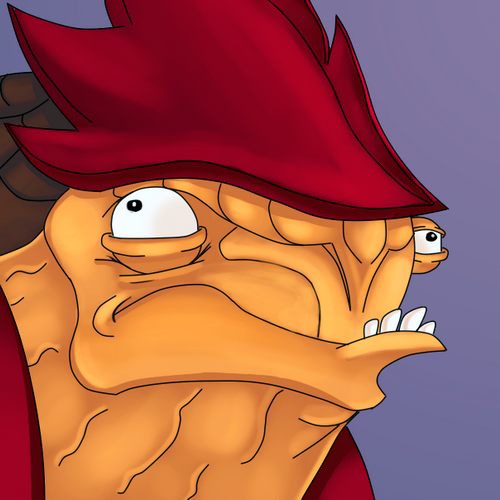
All hail Derp, Philosopher-King of the Universe
When you put it like that, sign me up! On the plus side, none of your friends will die. You know, except the ones who were killed in the relay explosions or left on a brick of a planet with no means of escape and no method of obtaining or growing food. Not that the quarians or turians can even eat food that would grow on Earth. But the mole men mutants, who've now turned to a life of sucking nutrients out of algae, won't have to worry about any more trouble, right?
Well, on the negative side, you cease completely to be a living being. Every human ideal you fought for, you now become a perversion of. And if you can live with that, it gets even better. Now you get to dominate a hyper advanced slave race! Because that's what reapers are. They are the essence of a species distilled into a single abomination given form for the sole purpose of destroying life to save it. And now, they have no purpose. The only thing they can be used for peacefully is transportation. They are weapons of war in a now warless society. For now, anyway! In 50,000 years, when the great ancestors of all your dearly beloved and long-dead friends come back, you will have to live with the temptation of not turning your back on everything you ever stood for and directly interfering in their future. The best case scenario is heading back out to dark space, to listen to a bunch of Lovecraftian horrors bitch about the good ol' days. The worst case scenario is you become the next space baby, but with a slightly better haircut.
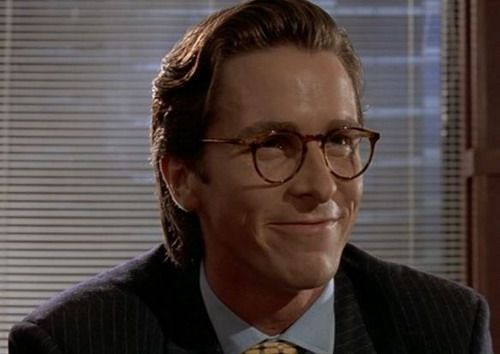
Your compliment was sufficient, civilization.
First of all, only a non-scientist writer can make a statement like, "synthesis is the final evolution of life." That's demonstrably untrue on multiple levels. First, it completely disregards the concept of biodiversity, which is key to science-y things like evolution. And so will you, if you choose this ending. The pinnacle of evolution is not "everything becomes the same." That's the fucking exact opposite of evolution. But let's forget the science gripe because honestly, they threw out the science part of science fiction when they introduced a space baby in the first place. Let's talk about this from a moral standpoint, which is allegedly one of the pillars of the series. This ending is essentially the Lathe of Heaven ending. If you haven't read it, then seriously, read it. But I'll sum up the point of the comparison.
In The Lathe of Heaven, the protagonist George Orr has the ability to change reality with his dreams. He suppresses them by taking drugs, so that he doesn't accidentally ruin all of reality. When George's court-ordered therapist discovers the power, he tries to use George to improve the world. The first major change he attempts is to have George dream racism out of the world. And when George wakes up, he finds that all people are grey, and every culture that ever existed has been completely annihilated from time. Because if there's no culture, there's no racism.
So too is the reality presented in the Synthesis ending. You are making a decision for ALL LIFE in the universe to be unified into one life form without any input from ALL LIFE whatsoever. The only guy you have to bounce the idea off of has killed thousands of civilizations, so maybe he's not the best moral compass. Don't you wish everyone you ever saw looked and thought exactly like you? No? Well, too bad, Shepard doesn't need your permission. That's pretty much as amoral as it gets without killing everyone horribly. Which also still happens. Sure, you'll have your body as it exists now, but what about your kids? Or your kids' kids? Human culture, turian culture, quarian culture, geth culture, all of these things die for peace. And it's not a natural convergence, it's a forced one. You're pointing a gun at the head of art, culture and free thought. There's no peace quite like the kind where everyone who's not like you dies! I know one guy who really killed for this ending.
This one is easy to debunk. Just watch the video, the guy who came up with it himself says it didn't happen that way.
Not good enough? You want more? Alright.
The main issue with the indoctrination theory is that it mistakes stupid nihilism for purposeful nihilism. The endings of Mass Effect 3 are shitty because they're slapped on and ill-conceived. They aren't trying to be nihilistic on purpose. They don't intend to tell you that you're a monster and you're murdering all of your friends. They end up doing that carelessly. The point of the Mass Effect 3 ending is to make you feel some kind of ultimate sacrifice. They just happened to choose a method and manner of sacrifice that devalues the entire experience. Bioware didn't do this on purpose. It's like the ending of Fable II, where you can use the power of the magic spire to either bring back to life everyone who ever died unjustly over the past four years, or your dead dog. They didn't write that trying to make some kind of clever point, they clearly just didn't realize how stupid it sounds, because no one apparently read it out loud during the development cycle.
If the entire series was written to this end, to have it all be a crazy plot twist of indoctrination at the end, there'd be far more indication of it throughout ALL 3 games, and you wouldn't need someone on Youtube to take twenty minutes explaining how all the minutia adds up. It's clear that Bioware added zero minutia up. I know that's frustrating. But when have you ever known a AAA game to be capable of subtlety on that level? And why wouldn't they point it out instead of hiding it in the back of a codex and hoping you'll notice some recycled art assets? When they did it in Bioshock, it garnered critical praise.
Shepard's ears are burning as he hears this speech.
But then, Bioshock did it like this. This is how games handle actual, intended plot twists. They make them an ostensible, visible part of the plot. They're in your face. They cost millions of dollars to produce. And in a game that's supposed to be about choice, you can be damn sure that if the twist in the end is that you had no choices, they'd point it out and blow your fucking mind.
But we can break this up even more easily. The same logic that renders the Mass Effect 3 ending as it stands an immense failure can also dismantle the indoctrination theory. Simply put, if Shepard was indoctrinated, wouldn't he be more valuable to the reapers as a corpse?
Shepard is the great unifier. Having you play out a grand illusion only works if the reapers are trying to fool a person playing the video game and not anyone in it. There's nothing to gain in fooling Shepard or the people around him. Why would the reapers use him? They don't need him. They clearly don't believe they need him. They don't need him so bad that they made sure to kill him at the beginning of Mass Effect 2. I'm sorry to say it, but in the same way that believing Cameron imagined Ferris Bueller makes for more compelling fiction, it still wasn't written with that intention.
They indoctrinated Cameron. The war is lost!
And one more thing: if Shepard was indoctrinated, Javik would be able to tell. You know, the avatar of vengeance against the reapers. I guess Acavyos didn't download him.
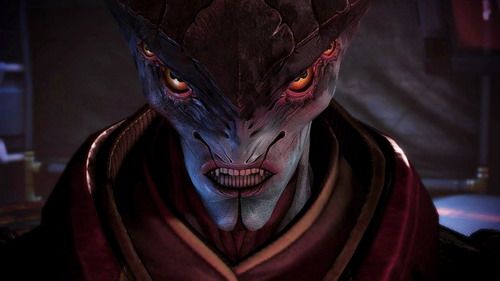
This is the face of tolerance.
It's been four months now since the ending of the game and honestly, I still couldn't tell you why it came out the way it did. I'm honestly dumbfounded by it. I have theories, of course. Everyone seems to. I think that EA brought in a corporate influence that was poisonous to the creative process. Prior to EA's involvement, Mass Effect was an ambitious, and majorly unpolished shooter RPG. Afterwards, well....





Call me a cynic, but this is what the death of art looks like to me. Nothing lowers an already emotionally flatlined ending by being poked with a finger and reminded that there's still money in that wallet that could be Mass Effectin' your gamerscore!
I also think executive producer Casey Hudson and lead writer Mac Walters wanted to leave their own impression on the series, but didn't fundamentally understand or appreciate its themes. Mac in particular says this:
"One of the key things I wanted to do is add a sense of humanity to
Shepard. The option is there — if people want it — to let Shepard
explore how they feel about all the crap that they’ve been through. How
would Shepard — the generic Shepard, right down the middle – respond to
being relieved of duty? They’ve been trying to alert the entire galactic
community to the fact that there’s Reapers out there. They’ve literally
died and been brought back. There’s a sense that Shepard is getting a
bit tired of it all. Without it becoming complaining or whining, I
wanted to get a sense of that tired soldier who’s been there and done
it.
I’m hoping that Shepard really comes across as a little bit more
three-dimensional than [the character] has in the past. Not just, “Tell
me about this. I should go.” I can actually express how I’m feeling
about the war back on Earth. Again, there’s the option to engage in
that, and an option to say how you feel about it. It’s your Shepard."
Seeing how the sentiment above is actually played out in-game, I think Mac lost sight of the line between film and games. The same bits that the indoctrination theory grab at to say, "this is all a crazy dream!" read to me as the team trying to make the game more like a film and less interactive. To imply that Shepard didn't have humanity in the first two games is just cynical.
This is Shepard being a human being. If that isn't clear, then you really have no business writing the character.
This is Shepard being a movie character. This kind of scene works perfectly for a film that is trying to communicate something about the protagonist's thoughts. But Mass Effect is not a film, it's a game. The player is the one who dictates Shepard's thoughts, by inputting them directly through action. This scene serves to tell me something about Shepard that I didn't decide was true about him. Whether I'm paragon or renegade Shepard, it's the same scene. He feels guilty about not being able to save people. In my renegade playthrough, where I've lost count of the amount of corpses I've stepped over after shooting in them in the face, this scene really doesn't make sense. It doesn't help that it's the first child you ever see in the entire series, and they kill him to make a trite emotional moment. I as a player felt that was cheap, so to watch Shepard then drag his heels through an hour of sad face cinematics really disconnected me from the experience. If anything, given Shepard's personality, watching a child die coldly at the hand of a reaper should have reignited the fire in him, not snuffed it out.
And on the Citadel, Shepard's interaction with the star child also tells me something about Shepard that I didn't decide - that in the end, everything he said, felt and did; for his friends, detractors, and even adversaries, was all a lie. He meant none of it, because when the time came to tell his story and teach the Catalyst what being alive really means, he just stood there. Quietly waiting for his instructions on how to betray everything he is supposed to care about.
In the end, the Mass Effect trilogy serves as an object lesson. When you are telling a story, whether it's in the form of a novel, a film, or a video game, understand why you're telling your story. Trying to make your own brand of another person's story is how this kind of thing happens. When the player puts down the controller, after seven years together with your art, what do you want them to take away? Mass Effect 3 seems paralyzed by that question. And so, it simply chooses not to answer it. I think the response in the past four months has shown that chickening out like that is folly. Art does not exist to say nothing. And you can't hide your lack of a message in the obscurity of an art house impressionist ending like this.
The real shame of it, the one that as a gamer depresses me to no end, is the lost opportunity in the Mass Effect trilogy. I honestly believe this could have been the game that reminds everyone why games are great as games and not just semi-adept at aping the conventions of film. Shepard stood poised for a long time as an emblem of how the player's will is the most powerful force in gaming fiction. Gaming is not just about being a viewer. It's also about being a director, and that doesn't just mean walking from story point to story point. It's also telling your own story. Mass Effect never truly achieved this on truly transcendent level, but it aspired to, for a time. And I think, when Shepard stopped trying, that was a blow to the world of possibilities in the real world.
Maybe that's what the ending is supposed to signify. Perhaps it was all a grand criticism of the structure of games. You have Shepard, who is the core definition of a video game protagonist, and in the end, everything he ever did means nothing. No matter what you do, it all ends the same. Hope is pointless, and there are no heroes. Maybe that's what Mac is trying to say: that the way protagonists exist and affect the narratives they are a part of is primitive, and has no correlation to reality.
But I really don't think so. Corporations like EA don't spent millions of dollars to smash an IP into the ground. The money is ALWAYS king, above all other considerations. I don't think "I'm Commander Shepard and this is my favorite betrayal on the Citadel" t-shirts are gonna cover the marketing disaster of the last four months that they're still halfway apologizing for.
I hope the cupcakes were good.
The first official company explanation to the fans, something neither Casey Hudson nor Mac Walters thought warranted an appearance.



Comments